英语动词的时态用法总结及答案
- 格式:doc
- 大小:76.00 KB
- 文档页数:14
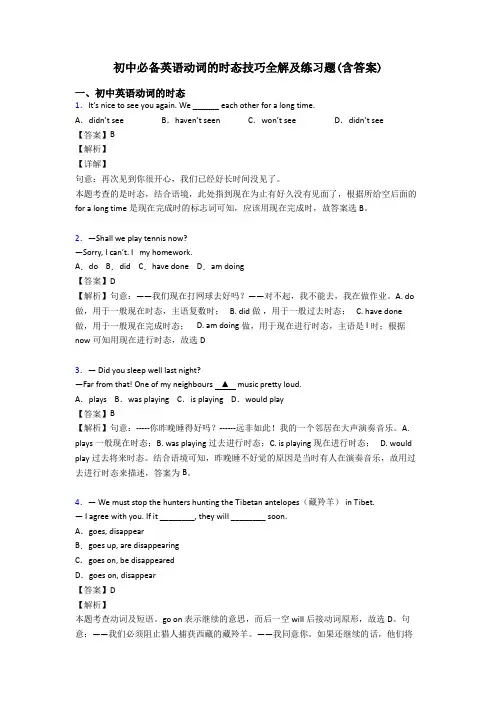
初中必备英语动词的时态技巧全解及练习题(含答案)一、初中英语动词的时态1.It’s nice to see you again. We ______ each other for a long time.A.didn’t see B.haven’t seen C.won’t see D.didn’t see【答案】B【解析】【详解】句意:再次见到你很开心,我们已经好长时间没见了。
本题考查的是时态,结合语境,此处指到现在为止有好久没有见面了,根据所给空后面的for a long time是现在完成时的标志词可知,应该用现在完成时,故答案选B。
2.—Shall we play tennis now?—Sorry, I can’t. I my homework.A.do B.did C.have done D.am doing【答案】D【解析】句意:——我们现在打网球去好吗?——对不起,我不能去,我在做作业。
A. do 做,用于一般现在时态,主语复数时; B. did做,用于一般过去时态; C. have done 做,用于一般现在完成时态; D. am doing做,用于现在进行时态,主语是I时;根据now可知用现在进行时态,故选D3.— Did you sleep well last night?—Far from that! One of my neighbours ▲ music pretty loud.A.plays B.was playing C.is playing D.would play【答案】B【解析】句意:-----你昨晚睡得好吗?------远非如此!我的一个邻居在大声演奏音乐。
A. plays一般现在时态;B. was playing 过去进行时态;C. is playing 现在进行时态; D. would play过去将来时态。
结合语境可知,昨晚睡不好觉的原因是当时有人在演奏音乐,故用过去进行时态来描述,答案为B。
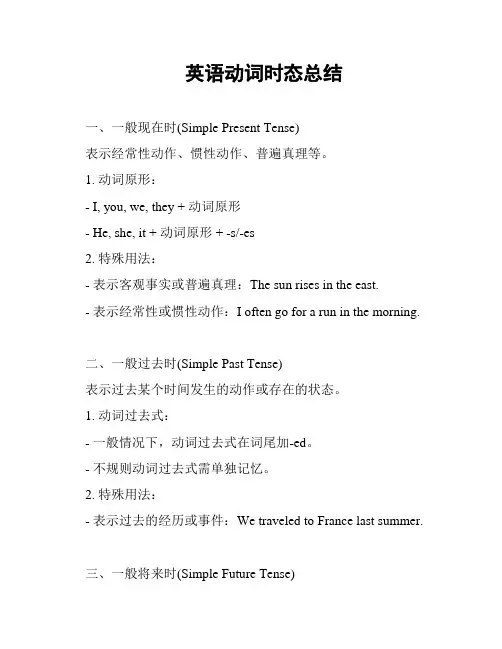
英语动词时态总结一、一般现在时(Simple Present Tense)表示经常性动作、惯性动作、普遍真理等。
1. 动词原形:- I, you, we, they + 动词原形- He, she, it + 动词原形 + -s/-es2. 特殊用法:- 表示客观事实或普遍真理:The sun rises in the east.- 表示经常性或惯性动作:I often go for a run in the morning.二、一般过去时(Simple Past Tense)表示过去某个时间发生的动作或存在的状态。
1. 动词过去式:- 一般情况下,动词过去式在词尾加-ed。
- 不规则动词过去式需单独记忆。
2. 特殊用法:- 表示过去的经历或事件:We traveled to France last summer.三、一般将来时(Simple Future Tense)表示将来发生的动作或存在的状态。
1. will/shall + 动词原形:- I, you, he, she, it, we, they + will + 动词原形- I, we + shall + 动词原形2. 特殊用法:- 表示决定、承诺、意愿等:I will help you with your homework.四、现在进行时(Present Continuous Tense)表示现在正在进行的动作。
1. be(am/is/are) + 动词-ing:- I + am + 动词-ing- He, she, it + is + 动词-ing- You, we, they + are + 动词-ing2. 特殊用法:- 表示现在进行的动作:I am studying for the exam.五、过去进行时(Past Continuous Tense)表示过去某个时间正在进行的动作。
1. was/were + 动词-ing:- I, he, she, it + was + 动词-ing- You, we, they + were + 动词-ing2. 特殊用法:- 表示过去正在进行的动作:She was watching TV when I arrived.六、将来进行时(Future Continuous Tense)表示将来某个时间正在进行的动作。
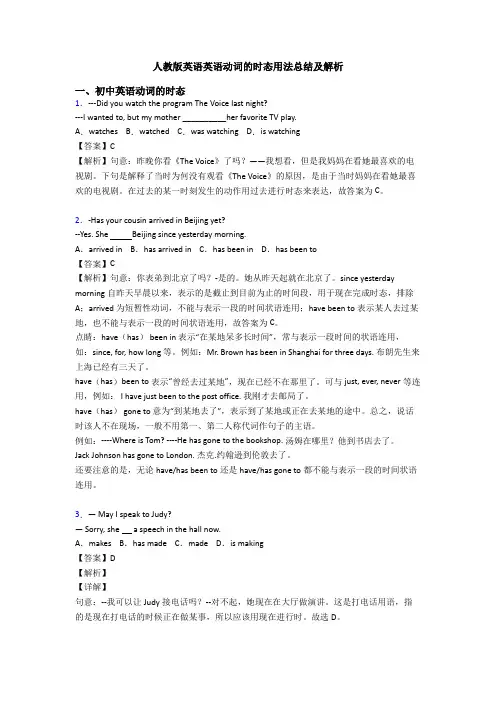
人教版英语英语动词的时态用法总结及解析一、初中英语动词的时态1.---Did you watch the program The Voice last night?---I wanted to, but my mother __________her favorite TV play.A.watches B.watched C.was watching D.is watching【答案】C【解析】句意:昨晚你看《The Voice》了吗?——我想看,但是我妈妈在看她最喜欢的电视剧。
下句是解释了当时为何没有观看《The Voice》的原因,是由于当时妈妈在看她最喜欢的电视剧。
在过去的某一时刻发生的动作用过去进行时态来表达,故答案为C。
2.-Has your cousin arrived in Beijing yet?--Yes. She Beijing since yesterday morning.A.arrived in B.has arrived in C.has been in D.has been to【答案】C【解析】句意:你表弟到北京了吗?-是的。
她从昨天起就在北京了。
since yesterday morning自昨天早晨以来,表示的是截止到目前为止的时间段,用于现在完成时态,排除A;arrived为短暂性动词,不能与表示一段的时间状语连用;have been to表示某人去过某地,也不能与表示一段的时间状语连用,故答案为C。
点睛:have(has) been in 表示“在某地呆多长时间”,常与表示一段时间的状语连用,如:since, for, how long 等。
例如:Mr. Brown has been in Shanghai for three days. 布朗先生来上海已经有三天了。
have(has)been to表示“曾经去过某地”,现在已经不在那里了。
可与just, ever, never等连用,例如: I have just been to the post office. 我刚才去邮局了。
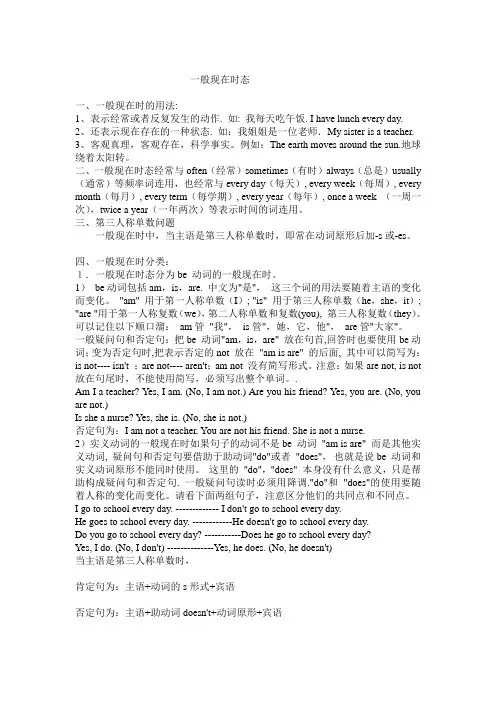
一般现在时态一、一般现在时的用法:1、表示经常或者反复发生的动作. 如: 我每天吃午饭. I have lunch every day.2、还表示现在存在的一种状态. 如:我姐姐是一位老师.My sister is a teacher.3、客观真理,客观存在,科学事实。
例如:The earth moves around the sun.地球绕着太阳转。
二、一般现在时态经常与often(经常)sometimes(有时)always(总是)usually (通常)等频率词连用,也经常与every day(每天), every week(每周), every month(每月), every term(每学期), every year(每年), once a week (一周一次),twice a year(一年两次)等表示时间的词连用。
三、第三人称单数问题一般现在时中,当主语是第三人称单数时,即常在动词原形后加-s或-es。
四、一般现在时分类:1.一般现在时态分为be 动词的一般现在时。
1)be动词包括am,is,are. 中文为"是",这三个词的用法要随着主语的变化而变化。
"am" 用于第一人称单数(I); "is" 用于第三人称单数(he,she,it); "are "用于第一人称复数(we),第二人称单数和复数(you), 第三人称复数(they)。
可以记住以下顺口溜:am管"我",is管",她,它,他",are管"大家"。
一般疑问句和否定句:把be 动词"am,is,are" 放在句首,回答时也要使用be动词;变为否定句时,把表示否定的not 放在"am is are" 的后面, 其中可以简写为:is not---- isn't ;are not---- aren't;am not 没有简写形式。
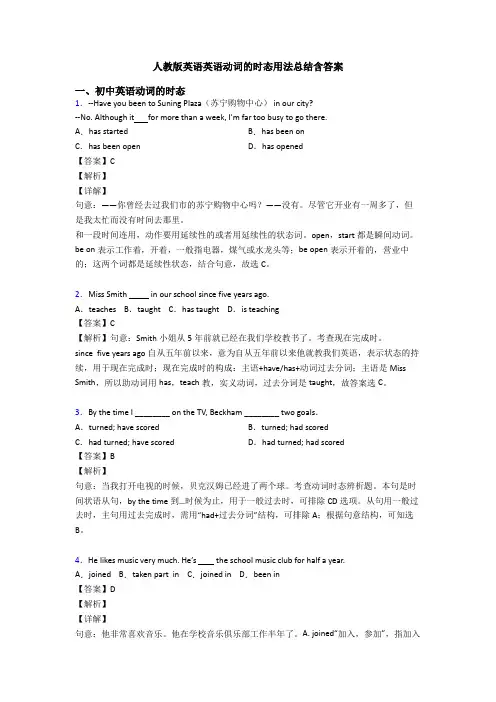
人教版英语英语动词的时态用法总结含答案一、初中英语动词的时态1.--Have you been to Suning Plaza(苏宁购物中心) in our city?--No. Although it for more than a week, I'm far too busy to go there.A.has started B.has been onC.has been open D.has opened【答案】C【解析】【详解】句意:——你曾经去过我们市的苏宁购物中心吗?——没有。
尽管它开业有一周多了,但是我太忙而没有时间去那里。
和一段时间连用,动作要用延续性的或者用延续性的状态词。
open,start都是瞬间动词。
be on表示工作着,开着,一般指电器,煤气或水龙头等;be open表示开着的,营业中的;这两个词都是延续性状态,结合句意,故选C。
2.Miss Smith in our school since five years ago.A.teaches B.taught C.has taught D.is teaching【答案】C【解析】句意:Smith小姐从5年前就已经在我们学校教书了。
考查现在完成时。
since five years ago自从五年前以来,意为自从五年前以来他就教我们英语,表示状态的持续,用于现在完成时;现在完成时的构成:主语+have/has+动词过去分词;主语是Miss Smith,所以助动词用has,teach教,实义动词,过去分词是taught,故答案选C。
3.By the time I ________ on the TV, Beckham ________ two goals.A.turned; have scored B.turned; had scoredC.had turned; have scored D.had turned; had scored【答案】B【解析】句意:当我打开电视的时候,贝克汉姆已经进了两个球。
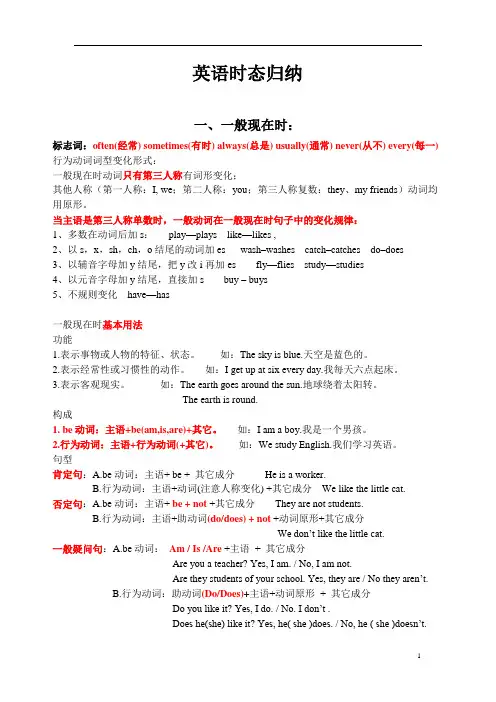
英语时态归纳一、一般现在时:标志词:often(经常) sometimes(有时) always(总是) usually(通常) never(从不) every(每一)行为动词词型变化形式:一般现在时动词只有第三人称有词形变化;其他人称(第一人称:I, we;第二人称:you;第三人称复数:they、my friends)动词均用原形。
当主语是第三人称单数时,一般动词在一般现在时句子中的变化规律:1、多数在动词后加s:play—plays like—likes ,2、以s,x,sh,ch,o结尾的动词加es wash–washes catch–catches do–does3、以辅音字母加y结尾,把y改i再加es fly—flies study—studies4、以元音字母加y结尾,直接加s buy – buys5、不规则变化have—has一般现在时基本用法功能1.表示事物或人物的特征、状态。
如:The sky is blue.天空是蓝色的。
2.表示经常性或习惯性的动作。
如:I get up at six every day.我每天六点起床。
3.表示客观现实。
如:The earth goes around the sun.地球绕着太阳转。
The earth is round.构成1. be动词:主语+be(am,is,are)+其它。
如:I am a boy.我是一个男孩。
2.行为动词:主语+行为动词(+其它)。
如:We study English.我们学习英语。
句型肯定句:A.be动词:主语+ be + 其它成分He is a worker.B.行为动词:主语+动词(注意人称变化) +其它成分We like the little cat.否定句:A.be动词:主语+ be + not+其它成分They are not students.B.行为动词:主语+助动词(do/does) + not+动词原形+其它成分We don’t like the little cat.一般疑问句:A.be动词:Am / Is /Are +主语+ 其它成分Are you a teacher? Yes, I am. / No, I am not.Are they students of your school. Yes, they are / No they aren’t.B.行为动词:助动词(Do/Does)+主语+动词原形+ 其它成分Do you like it? Yes, I do. / No. I don’t .Does he(she) like it? Yes, he( she )does. / No, he ( she )doesn’t.特殊疑问句:疑问词+ 一般疑问句A.be动词:How many students are there in your school?B.行为动词:What do you usually do on Sunday?一般现在时动词be和have的变化形式1.动词Be 叫连系动词, 用法:第一人称单数用am,第三人称单数用is,其它人称用are。
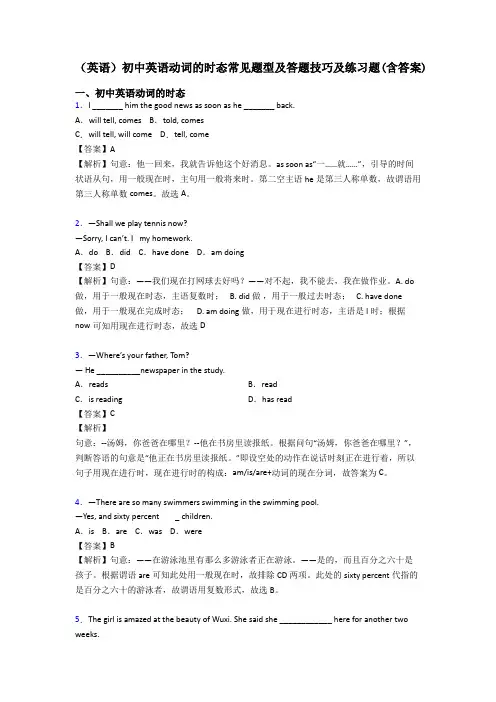
(英语)初中英语动词的时态常见题型及答题技巧及练习题(含答案)一、初中英语动词的时态1.I _______ him the good news as soon as he _______ back.A.will tell, comes B.told, comesC.will tell, will come D.tell, come【答案】A【解析】句意:他一回来,我就告诉他这个好消息。
as soon as“一……就……”,引导的时间状语从句,用一般现在时,主句用一般将来时。
第二空主语he是第三人称单数,故谓语用第三人称单数comes。
故选A。
2.—Shall we play tennis now?—Sorry, I can’t. I my homework.A.do B.did C.have done D.am doing【答案】D【解析】句意:——我们现在打网球去好吗?——对不起,我不能去,我在做作业。
A. do 做,用于一般现在时态,主语复数时; B. did做,用于一般过去时态; C. have done做,用于一般现在完成时态; D. am doing做,用于现在进行时态,主语是I时;根据now可知用现在进行时态,故选D3.—Where’s your father, Tom?— He __________newspaper in the study.A.reads B.readC.is reading D.has read【答案】C【解析】句意:--汤姆,你爸爸在哪里?--他在书房里读报纸。
根据问句“汤姆,你爸爸在哪里?”,判断答语的句意是“他正在书房里读报纸。
”即设空处的动作在说话时刻正在进行着,所以句子用现在进行时,现在进行时的构成:am/is/are+动词的现在分词,故答案为C。
4.—There are so many swimmers swimming in the swimming pool.—Yes, and sixty percent _ children.A.is B.are C.was D.were【答案】B【解析】句意:——在游泳池里有那么多游泳者正在游泳。
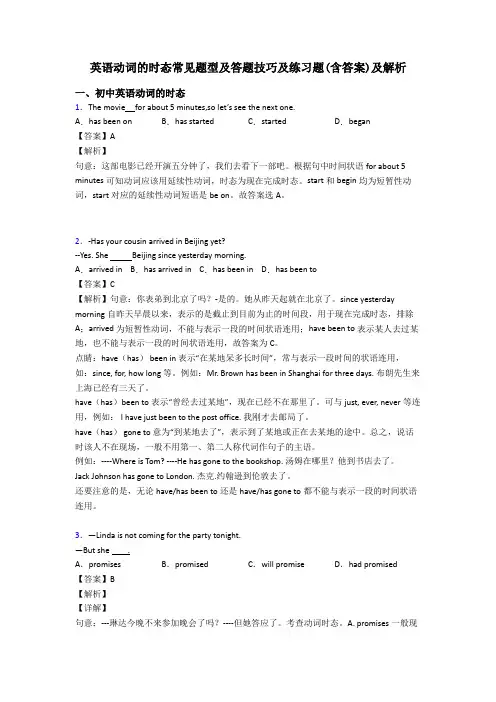
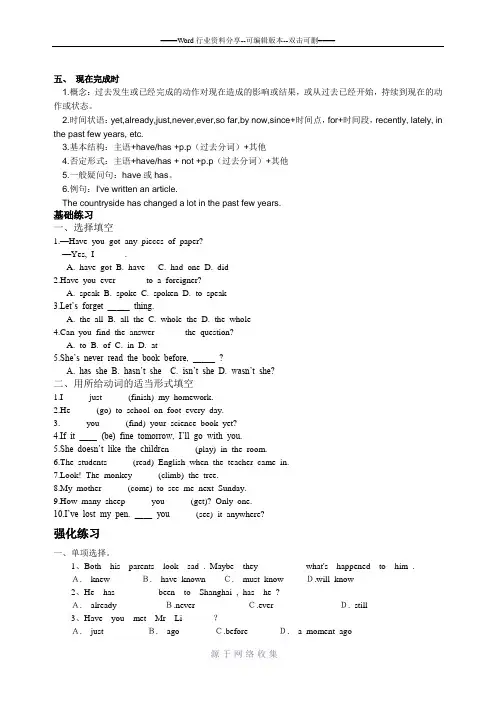
五、现在完成时1.概念:过去发生或已经完成的动作对现在造成的影响或结果,或从过去已经开始,持续到现在的动作或状态。
2.时间状语:yet,already,just,never,ever,so far,by now,since+时间点,for+时间段,recently, lately, in the past few years, etc.3.基本结构:主语+have/has +p.p(过去分词)+其他4.否定形式:主语+have/has + not +p.p(过去分词)+其他5.一般疑问句:have或has。
6.例句:I've written an article.The countryside has changed a lot in the past few years.基础练习一、选择填空1.—Have you got any pieces of paper?—Yes, I _____ .A. have gotB. haveC. had oneD. did2.Have you ever _____ to a foreigner?A. speakB. spokeC. spokenD. to speak3.Let’s forget _____ thing.A. the allB. all theC. whole theD. the whole4.Can you find the answer _____ the question?A. toB. ofC. inD. at5.She’s never read the book before, _____ ?A. has sheB. hasn’t sheC. isn’t sheD. wasn’t she?二、用所给动词的适当形式填空1.I ____ just ____ (finish) my homework.2.He ____ (go) to school on foot every day.3. ____ you ____ (find) your science book yet?4.If it ____ (be) fine tomorrow, I’ll go with you.5.She doesn’t like the childr en ____ (play) in the room.6.The students ____ (read) English when the teacher came in.7.Look! The monkey ____ (climb) the tree.8.My mother ____ (come) to see me next Sunday.9.How many sheep ____ you ____ (get)? Only one.10.I’ve lost my pen. ____ you ____ (see) it anywhere?强化练习一、单项选择。
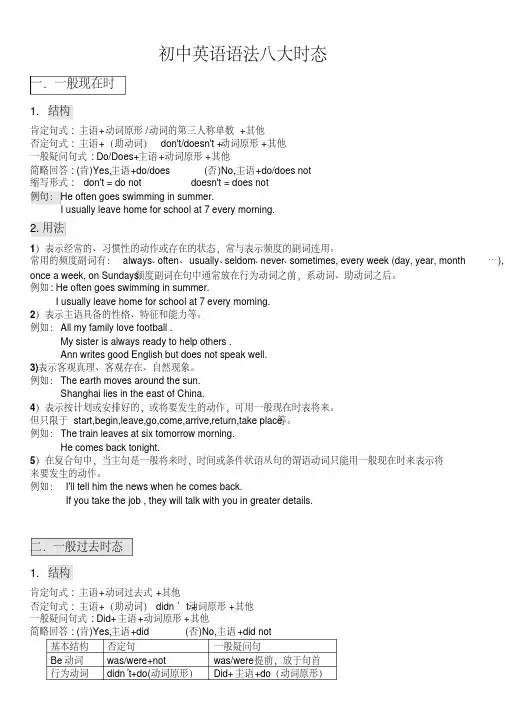
初中英语语法八大时态一.一般现在时1.结构肯定句式: 主语+动词原形/动词的第三人称单数+其他否定句式: 主语+(助动词)don't/doesn't +动词原形+其他一般疑问句式: Do/Does+主语+动词原形+其他简略回答: (肯)Yes,主语+do/does (否)No,主语+do/does not缩写形式: don't = do not doesn't = does not例句:He often goes swimming in summer.I usually leave home for school at 7 every morning.2.用法1)表示经常的、习惯性的动作或存在的状态,常与表示频度的副词连用。
常用的频度副词有:always、often、usually、seldom、never、sometimes, every week (day, year, month…), once a week, on Sundays.频度副词在句中通常放在行为动词之前,系动词、助动词之后。
例如: He often goes swimming in summer.I usually leave home for school at 7 every morning.2)表示主语具备的性格、特征和能力等。
例如:All my family love football .My sister is always ready to help others .Ann writes good English but does not speak well.3)表示客观真理、客观存在、自然现象。
例如:The earth moves around the sun.Shanghai lies in the east of China.4)表示按计划或安排好的,或将要发生的动作,可用一般现在时表将来。
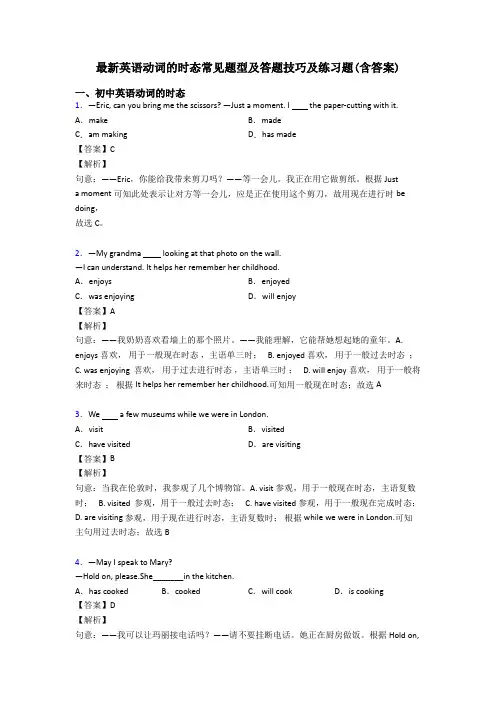
最新英语动词的时态常见题型及答题技巧及练习题(含答案)一、初中英语动词的时态1.―Eric, can you bring me the scissors? ―Just a moment. I the paper-cutting with it. A.make B.madeC.am making D.has made【答案】C【解析】句意:——Eric,你能给我带来剪刀吗?——等一会儿。
我正在用它做剪纸。
根据Justa moment可知此处表示让对方等一会儿,应是正在使用这个剪刀,故用现在进行时be doing,故选C。
2.—My grandma looking at that photo on the wall.—I can understand. It helps her remember her childhood.A.enjoys B.enjoyedC.was enjoying D.will enjoy【答案】A【解析】句意:——我奶奶喜欢看墙上的那个照片。
——我能理解,它能帮她想起她的童年。
A. enjoys喜欢,用于一般现在时态,主语单三时; B. enjoyed 喜欢,用于一般过去时态;C. was enjoying 喜欢,用于过去进行时态,主语单三时;D. will enjoy喜欢,用于一般将来时态;根据It helps her remember her childhood.可知用一般现在时态;故选A3.We a few museums while we were in London.A.visit B.visitedC.have visited D.are visiting【答案】B【解析】句意:当我在伦敦时,我参观了几个博物馆。
A. visit 参观,用于一般现在时态,主语复数时; B. visited 参观,用于一般过去时态; C. have visited 参观,用于一般现在完成时态;D. are visiting 参观,用于现在进行时态,主语复数时;根据 while we were in London.可知主句用过去时态;故选B4.—May I speak to Mary?—Hold on, please.She_______in the kitchen.A.has cooked B.cooked C.will cook D.is cooking【答案】D【解析】句意:——我可以让玛丽接电话吗?——请不要挂断电话。
(英语)英语动词的时态常见题型及答题技巧及练习题(含答案)及解析一、初中英语动词的时态1.--I didn't see you at Olympic Sports Centre this morning. What happened?-- Sorry, I the exchange students around our school then.A.showed B.was showing C.am showing D.will show【答案】B【解析】句意:——今天早上我在奥运会体育中心没有看见你。
发生了什么?——对不起,我那时正领着交换生参观我们学校。
根据时间副词then可知此处用过去进行时,故选B。
2.Her son Coke, but now he milk.A.used to drink; is used to drinking B.used to drinking; drinksC.is used to drinking; used to drink D.was used to drink; is drinking【答案】A【解析】【详解】句意:她儿子过去常喝可乐,但现在他习惯喝牛奶。
used to do过去常常做;be used to doing sth习惯于做某事;drinks喝,第三人称单数形式;is drinking现在进行时,根据转折词but,可知前句表示过去喝可乐,后句表示习惯于喝牛奶,故选A。
3.—Shall we play tennis now?—Sorry, I can’t. I my homework.A.do B.did C.have done D.am doing【答案】D【解析】句意:——我们现在打网球去好吗?——对不起,我不能去,我在做作业。
A. do 做,用于一般现在时态,主语复数时; B. did做,用于一般过去时态; C. have done 做,用于一般现在完成时态; D. am doing做,用于现在进行时态,主语是I时;根据now可知用现在进行时态,故选D4.I_______this mobile phone online. It is not worth buying.A.check B.am checking C.have checked D.will check【答案】C【解析】【详解】句意:我在网上查过这部手机。
16种英语时态总结归纳时态(Tense)是表示行为、动作和状态在各种时间条件下的动词形式。
因此,当我们说时态结构的时候,指的是相应时态下的动词形式。
英语时态分为16种:一般现在、一般过去、一般将来、过去将来时,以及这四者的进行时、完成时和完成进行时。
1. 一般现在时1) 用法:①表示现在发生的动作、情况、状态和特征。
②习惯用语。
③经常性、习惯性动作。
例:He always helps others. (他总是帮助别人。
)④客观事实和普遍真理。
尤其要注意,如果前后文不是一般现在时,则无法保持主句、从句时态一致。
⑤表示一个按规定、计划或安排要发生的动作,(仅限于某些表示“来、去、动、停、开始、结束、继续”等的动词)可以与表示未来时间的状语搭配使用。
常见的用法是:飞机、火车、轮船、汽车等定期定点运行的交通方式。
例:The next train leaves at 3 o'clock this afternoon.(下一趟火车今天下午3点开车。
)How often does this shuttle bus run? (这班车多久一趟?)⑥在时间和条件状语从句里经常用一般现在(有时也用现在完成时)表示将来事情。
例:When you have finished the report, I will have waited for about 3 hours.(等你完成这份报告的时候,我就已经等了将近3个小时了。
)2)时间状语:always, usually, often, sometimes, every week (day, year, month…), once a week (day, year, month…), on Sundays (on Mondays …)3)否定形式:be, have, 其它动词2. 现在进行时(be doing)1)用法:①表示现阶段或说话时正在进行的动作及行为。
Lecture Nine理科班英语语法篇(九)动词的时态英语的时态(tense)是一种动词形式,不同的时态用以表示不同的时间与方式。
下面就英语中常见的八种基本时态进行阐述,其它的时态都是在这八种时态的基础上结合而成的。
一、一般现在时:1.概念:经常、反复发生的动作或行为及现在的某种状况。
2.时间状语:always, usually, often, sometimes, every week (day, year, month…), once a week, on Sundays,3.基本结构:动词原形(如主语为第三人称单数,动词上要加(e)S)4.否定形式:am/is/are+not;此时态的谓语动词若为行为动词,则在其前加don't,如主语为第三人称单数,则用doesn't,同时还原行为动词。
5.一般疑问句:把be动词放于句首;用助动词do提问,如主语为第三人称单数,则用does,同时,还原行为动词。
6.例句:. It seldom snows here.He is always ready to help others.Action speaks louder than words.二、一般过去时:1.概念:过去某个时间里发生的动作或状态;过去习惯性、经常性的动作、行为。
2.时间状语:ago, yesterday, the day before yesterday, last week(year, night, month…), in 1989, just now, at the age of 5, one day, long long ago, once upon a time, etc.3.基本结构:be动词;行为动词4.否定形式:was/were+not;在行为动词前加didn't,同时还原行为动词。
5.一般疑问句:was或were放于句首;用助动词do的过去式did 提问,同时还原行为动词。
一、选择题1.Lily and Lucy _______ their mother. They have big eyes and yellow hair.A.like both B.both are like C.both like D.are both like D解析:D【解析】【分析】【详解】句意:莉莉和露西都像他们的母亲。
他们有大眼睛和黄头发。
be like表示像……,both副词,两者都,放在be动词,助动词,情态动词之后,实意动词之前。
like动词,喜欢,根据题意,排除AC;both放在动词are之后,排除B。
根据题意,故选D。
2.Colours can change our moods and make us happy or sad .A.feel B.to feelC.felt D.feeling A解析:A【解析】【分析】考查:非谓语动词【详解】句意:色彩可以改变我们的心情,让我们感到快乐或悲伤,充满活力或疲倦。
短语make sb. do sth. 使/让某人做某事;用省略to的不定式做宾补;故选A。
3.These chicken wings taste ________. I want more.A.well B.wonderfully C.nice D.bad C解析:C【解析】【详解】句意:这些鸡翅尝起来不错。
我想要更多。
考查感官动词的用法及形容词辨析。
well好,副词;wonderfully精彩地;nice好的;bad 坏的。
taste是感官系动词,其后接形容词作表语,排除AB;根据题干中“I want more.”可知鸡翅尝起来很好,排除D。
故选C。
4.The woman made her husband_______ outside the gate yesterday afternoon.A.wait B.waiting C.to wait D.waited A解析:A【解析】【详解】句意:昨天下午那个女人让她的丈夫在门外等待。
(英语)中考英语动词的时态专题训练答案及解析一、初中英语动词的时态1.— The boy misses his parents very much.— So he does. They _________ the hometown for nearly two years.A.have left B.has left C.have been away from D.will leave【答案】C【解析】【详解】句意:——那个男孩非常想念他的父母。
——他的确是。
他们离开家乡几乎两年了。
leave 离开,是短暂性动词,不与时间段连用;be away离开,与时间段连用。
此处接时间段for nearly two years连用,故用延续性动词,故选C。
2.—May I speak to Mary?—Hold on, please.She_______in the kitchen.A.has cooked B.cooked C.will cook D.is cooking【答案】D【解析】句意:——我可以让玛丽接电话吗?——请不要挂断电话。
她正在厨房做饭。
根据Hold on, please.可知此处表示现在让对方别挂断电话,应是表示他找的玛丽正做某事,故用现在进行时be doing,故选D。
3.–What’s your father doing now? –He ______ the room.A.cleaned B.cleans C.has cleaned D.is cleaning【答案】D【解析】【详解】句意:——你父亲现在在干什么?——他在打扫房间考查动词时态。
cleaned一般过去时;cleans一般现在时;has cleaned现在完成时;is cleaning现在进行时。
根据问句可知此句时态是现在进行时;故选D。
4.My grandparents in that city since they got married.A.will live B.have lived C.live D.were living【答案】B【解析】句意:自从结婚以来,我祖父母就住在那个城市。
英语动词的时态练习及答案详解含答案解析一、初中英语动词的时态1.—Mum, where is my dictionary?—Oh, I didn’t see it, either. I’m afraid you ___________ it.A.are losing B.will lose C.have lost D.were losing【答案】C【解析】句意:——妈妈,我的字典在哪里?——哦,我也没有看到它,恐怕你把它弄丢了。
A. are losing现在进行时态; B. will lose一般将来时态;C. have lost现在完成时态; D. were losing 过去进行时态。
lose这一动词发生在过去,造成的结果是现在看不见了,属于完成的动作,要用现在完成时态来表达,故答案为C。
2.--- Where’s my father? Could tell me?--- He to Beijing. He’ll attend an important meeting.A.goes B.is going C.has gone D.has been【答案】C【解析】【详解】句意:——我的父亲在哪里?可以告诉我吗?——他已经去北京了。
他将参加一个重要会议。
考查动词时态辨析。
根据句意语境,可知父亲不在说话的地点已经去了北京,需用现在完成时,可排除AC两项。
have been to意为“曾经去过某地”,现在已不在那里了;have gone to意为“到某地去了”,说话时作句子主语的人不在现场,故选C。
3.When it began to rain heavily, she ________ for a bus at the bus stop.A.waited B.waits C.is waiting D.was waiting【答案】D【解析】句意:当雨下得很大时,她正在公共汽车站等公共汽车。
A. waited一般过去时;B. waits一般现在时;C. is waiting现在进行时;D. was waiting过去进行时。
英语动词的时态用法总结及答案一、初中英语动词的时态1.--Where is Grace?--She with her brother playing basketball at school.A.is practice B.is practicing C.are practicing D.are practice【答案】B【解析】句意:——格雷斯在哪里?——她正在和她哥哥在学校练习打篮球。
be后跟现在分词,构成现在进行时态,此句的主语为she,with her brother做状语,be用is,故答案为B。
点睛:主语为单数名词或代词,尽管后面跟有with,together with,along with,as well as,besides,except,but,like等介词或介词短语时,谓语动词用单数形式。
例如:Mike with his father has been to England. 迈克同他的父亲去过英格兰。
Mike, like his brother, enjoys playing football. 迈克像他的哥哥一样喜欢踢足球。
2.--- I went to see you last night, but you weren’t in. Where were you then?---I _______ a walk by the river.A.had B.was having C.have had D.have【答案】B【解析】【详解】句意:——昨晚我去看你了,但你不在。
那时你在哪里?——我在河边散步。
由上文中“Where were you then?”可知,问句是询问“昨天晚上当我去看望你的时候,你正在哪里?”此句表达的是过去正在发生的事情,要用过去进行时态。
故答案为B。
3.They don’t live here any longer. They to Chengdu last month.A.move B.moved C.will move D.are moving【答案】B【解析】【详解】句意:他们不再住在这里了,他们上个月搬到了成都。
考查一般过去时。
A. move一般现在时;B. moved一般过去时;C. will move一般将来时;D. are moving现在进行时。
根据They don’t live here any longer.可知此处句意为“他们上个月搬到了成都。
”由last month可知时态用一般过去时;故答案选B。
4.-Have you washed the clothes? -Not yet. But I _________ them in half an hour. A.washed B.have washed C.will wash D.wash【答案】C【解析】句意:——你洗衣服了吗?——还没有。
但我半小时以后就洗。
In half an hour半小时后,表示的是将来时间。
故选C。
5.If our government pay attention to the safety of food, our health in danger. A.isn’t; is B.doesn’t; will beC.won’t; is D.isn’t; will be【答案】B【解析】【详解】句意:如果我们的政府现在不注意食品安全,我们的健康就会出于危险之中。
结合语境可知,本句主语描述的是将来某时进行的动作,故用一般将来时态。
当主句描述将来时态,if引导的条件状语从句中用一般现在时态表示将来动作,结合语境可知选B。
6.My grandma dinner when I got home yesterday.A.cooks B.was cooking C.is cooking D.will cook【答案】B【解析】【详解】句意:昨天当我到家的时候,我的祖母正在做晚饭。
根据when I got home yesterday.可知,这里指的是昨天到家时,另一个动作正在发生,表示过去某个时刻正在进行的动作,应该用过去进行时。
其谓语动词的形式是:was/were doing,故选B。
7.Peter and Linda Beijing for Shanghai yesterday afternoon.A.leave B.left C.are leaving D.will leave【答案】B【解析】【详解】句意:昨天下午Peter和 Linda离开北京去上海了。
短语leave +某地+for+某地“离开某地去某地”根据yesterday afternoon可知,句子应该用一般过去时,故选B。
8.— What are you doing now, Kate?— I an email to my friend.A.write B.am writing C.wrote D.have written【答案】B【解析】句意:——凯特你在做什么?——我正在给我的朋友写电子邮件。
考查现在进行时。
根据What are you doing now, Kate?可知是问正在做什么,现在进行时态,所以回答也应用现在进行时,其构成为be+动词现在分词;主语是I,所以系动词be用am,write的现在分词是writing,故答案选B。
9.—Mum, where is my dictionary?—Oh, I didn’t see it, either. I’m afraid you ___________ it.A.are losing B.will lose C.have lost D.were losing【答案】C【解析】句意:——妈妈,我的字典在哪里?——哦,我也没有看到它,恐怕你把它弄丢了。
A. are losing现在进行时态; B. will lose一般将来时态;C. have lost现在完成时态; D. were losing 过去进行时态。
lose这一动词发生在过去,造成的结果是现在看不见了,属于完成的动作,要用现在完成时态来表达,故答案为C。
10.— Do you know _____ a wonderful match and two basketball matches on July 15 th ?— Yeah . I am going to watch them on that day.A.there will be B.there is going to have C.there are going to be D.is there going to be【答案】A【解析】【详解】句意:——你知道7月15日会有一场精彩的比赛和两场篮球赛吗?——是的。
那天我要去看它们。
考查there be结构。
宾语从句需用陈述句语序,D是疑问句语序,可排除。
根据句意语境,本句用一般将来时。
there be 结构的一般将来时用there will be 和there is going to be,表示最近要做的事,可排除B。
根据就近原则,a wonderful match一场精彩的比赛,需用there is going to be,可排除C项。
综合以上,可知选A。
11.— Could you tell me ________? I must find him.— Sorry. I have no idea. But he was here just now.A.where Tom was B.where Tom has goneC.where can I find Tom D.where Tom has been【答案】B【解析】【详解】句意:——你能告诉我汤姆去哪儿了吗?我必须找到他。
——对不起,我不知道。
但他刚才在这里。
本题主要考查宾语从句。
根据语境,你能告诉“我”汤姆在哪里吗。
where 引导的宾语从句在句中作 tell 的直接宾语,me 为间接宾语。
宾语从句使用陈述语序,故此处应用“where + 主语 + 谓语”的结构,主语为 Tom,谓语为 be 动词。
故排除C项。
根据语境时态和主句时态保持一致Could you tell me表示请求允许后用现在完成时,has gone是指去某地,没回来;has been指从某地回来了。
结合语境可知,是指Tom去了某地。
故选B。
12.— I think the plan is just a waste of time. What do you think?—Well, if you don’t support the plan, ________.A.neither do I B.so do I C.neither will I D.so will I【答案】C【解析】句意:——我认为这个计划只是在浪费时间。
您是怎么想的?——好,如果你不支持这个计划,我也不支持。
Neither+助动词+主语,表示主语也不是……;这里是if引导的条件状语从句,主句用一般将来时,从句用一般现在时态,这里是主句,故助动词用will。
根据题意,故选C。
点睛:Neither+助动词+主语,表示主语也不是这样;so+助动词+主语,表示主语也是这样。
13.--Today’s young people can’t live without smart phones.--Their eyes are glued to the screen wherever they go, even while they_____ meals.A.have B.are having C.were having D.will have【答案】B【解析】【详解】句意:——今天的年轻人离不开智能手机。
——无论走到哪里,他们的眼睛都盯着屏幕,即使是在吃饭的时候。
考查现在进行时。
while引导时间状语从句时,强调主句和从句的动作同时发生,从句中常用进行时态;根据Their eyes are glued to the screen wherever they go, even while可知从句强调的动作是现在进行时态,即“他们在吃饭的时候,同时也在玩手机”;现在进行时的构成为:主语+be动词(am/is/are)+动词现在分词;本句主语是they,所以be动词用are,have meals吃饭,have的现在分词是having;故答案选B。
14.We will go to Tian’anmen Square to watch the raising of national flag if it _________ tomorrow.A.will rain B.rainsC.doesn’t rain D.won’t rain【答案】C【解析】试题分析:句意:如果明天不下雨我们要去天安门广场看升国旗。